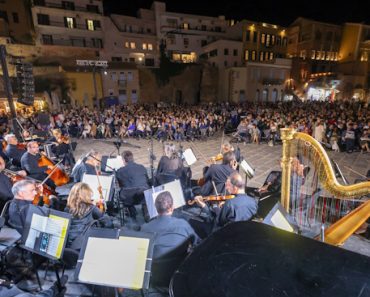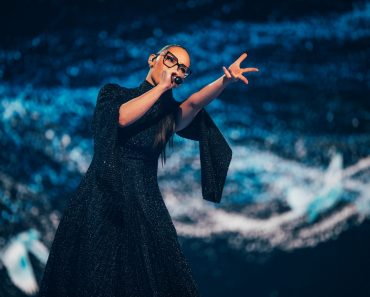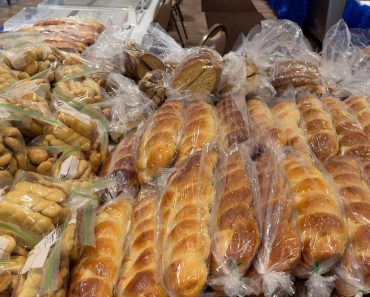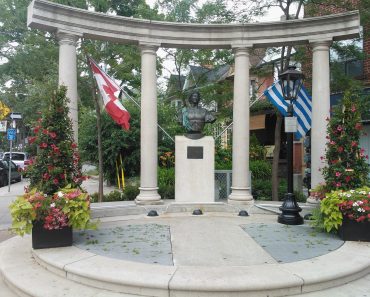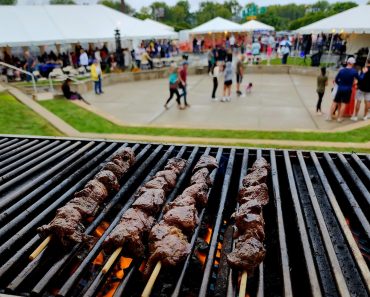Four years have passed today since that morning of September 2, 2021, when Mikis Theodorakis, the Archangel of Greek music and the national symbol of the struggle for freedom, flew off on his journey to eternity.
And yet, especially this year, his presence seems to be more pronounced than ever through the numerous events organized across the country to mark the 100th anniversary of his birth. Many of these are initiated and artistically directed by his daughter, Margarita Theodorakis, who has dedicated her life to the sacred duty of preserving and disseminating the vast and priceless musical oeuvre of the leading Greek composer.
“My father lived his entire life putting above all else his debt to the struggles for democracy and freedom. My own life debt is to continue his work. With the People’s Orchestra “Mikis Theodorakis” we are like missionaries. We travel his music all over Greece and from one end to the other of the world”, Margarita Theodorakis confesses to “THEMA”, while referring to the burden of the huge musical heritage she is called upon to manage, she says meaningfully: “I am not stressed by the fact that I have undertaken to manage and pass on such a heavy musical heritage. It’s not a burden to me, it’s a celebration, a feast. Nevertheless, we face difficulties because there is not much interest in good singing today. Most promoters prefer the labels of the time. I am not saying, of course, that there are no noteworthy young artists. Of course there are – and I am making efforts to get in touch with them to sing Miki’s songs.”
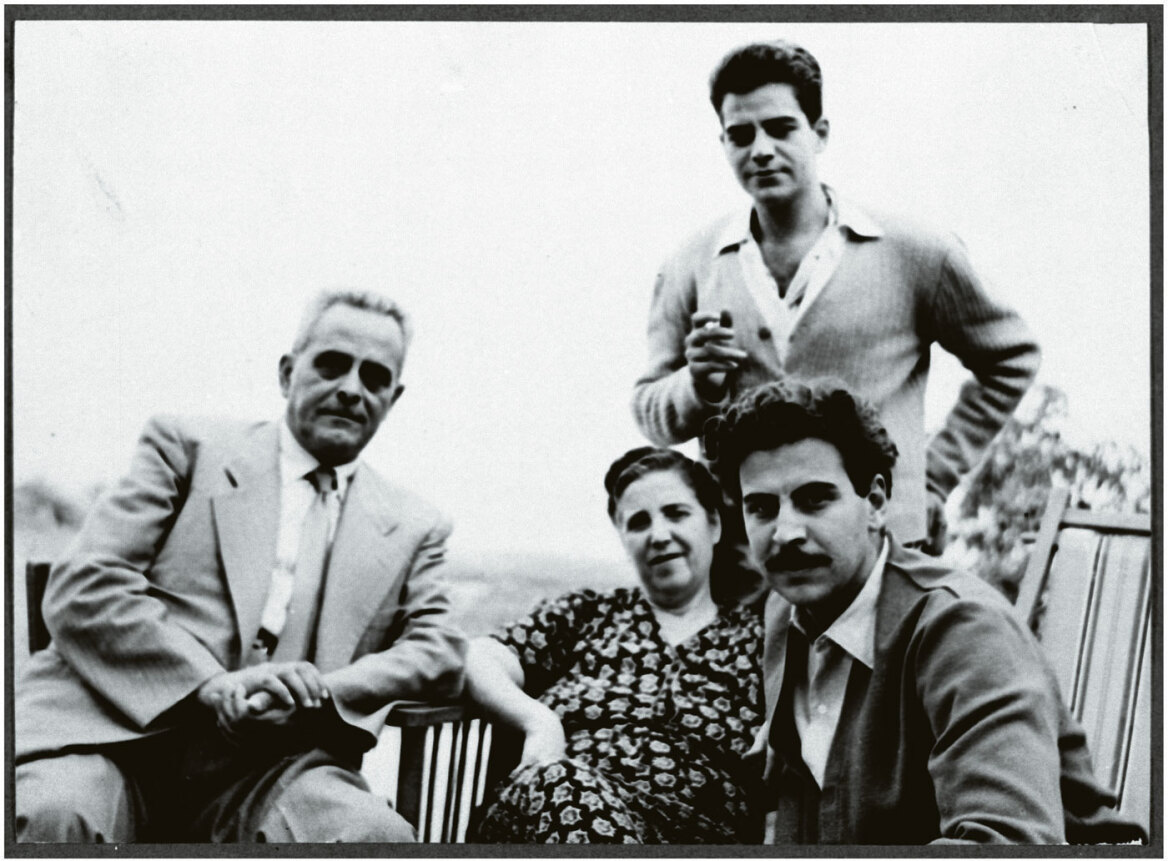
Margaret’s relationship with her father has been close, uninterrupted and intense throughout the years. Since Mikis Theodorakis never left his family – he took his beloved wife Myrto and his two children with him even in exile when he was given the opportunity – her life was always filled with the notes of his music and accompanied by all those important historical events in which he played a leading role, fighting for Freedom and Democracy. “We grew up next to him and the tension, the persecutions, the arrests, the exile were a daily reality for us, his children. But he taught us from a very early age not to be afraid, to push away fear and to be strong no matter how difficult the circumstances we face,” she explains, revealing the significant impact that Mikis, the father and fighter, had on her life and on the formation of her character.
I wonder how difficult it is to get used to the physical absence of such an important figure at whose side one has walked most of one’s life? How did these four years go for Margarita Theodorakis? “The loss of a parent is for all people a great wound. But we are made by nature to be able to manage this separation, so that the pain goes away with the passage of time and sweet memories remain. I miss a lot of Dad, I think about him all the time. When I’m at concerts I look up to the sky and feel like he sees and hears us. How is it possible not to miss such a special person, such a unique personality? Of course, while he was alive we disagreed on many things and argued, as happens in all families – we both had, you see, a dynamic character. But this man was so blessed, so talented, such a great fighter and front man that you couldn’t help but admire him, couldn’t help but adore him.”
Miki’s appointment with Apostolos Kaldaras
For the fourth anniversary of the death of the leading composer, Margarita Theodorakis chose to present a different, unexpected concert. To set up a musical dialogue between the music of Mikis Theodorakis and another important popular composer, Apostolos Kaldaras, in collaboration with his son, Kostas Kaldaras. So on Tuesday night, at the Vrakon Vrachon Theatre in Byron, Miki’s songs will “converse” for the first time with those of Kaldaras. “Drapetsona” will meet “Asia Minor”, “The moon is going for a walk” “Night without a moon”, “Margarita Margarot” “Whoever you are”, “Lay your mattress” “Let’s wish for the old days”, “Myrtle” “Dream deceptive”, “Boat on the hill” “You set me a course” through the interpretations of Vassilis Lekkas, Stelios Dionysiou, Sofia Papazoglou, Panagiotis Petrakis, Angelos Theodorakis, but also young Tecetzides.
“It was an idea of the composer and my friend Giorgos Andreou and as soon as I heard it, it seemed to me a very interesting challenge. Kaldaras was a great composer and wrote songs that people loved very much – and continue to sing to this day. As is the case with Miki. So we wove their songs into a single programme and created a brand new musical performance,” explains Margarita Theodorakis. The two composers had met but never collaborated. However, they had a high regard for each other. Mikis even described Kaldara as the “Chopin of Greece” and one of his favourite songs was “Night without a moon”. “He associated this song with Averoff Prison, back when he was incarcerated during the junta. There, behind the bars, he heard for the first time the new version of the song with the voice of Giorgos Dalaras”, Margarita Theodorakis tells us.
This special concert is one of a number of events being organised for the great composer in 2025, which has been declared the “Year of Miki Theodorakis”. Since the beginning of the year, his Folk Orchestra has been touring Greece from coast to coast, presenting live differences in aspects of his multifaceted musical work. And there is more to come…
“It’s a great pleasure that this year, on the occasion of the 100th anniversary of Miki’s birth, his music can be heard everywhere. We, apart from the great thrilling musical evening at the Kallimarmaro and the one with the songs of Theodorakis and Kaldara, have done several more concerts and we will continue. We will play in Hortiatis in Thessaloniki (1/9), in Peristeri (3/9), in Ancient Corinth (5/9), in Nea Smyrni (7/9), in Helexpo in Thessaloniki (9/9), in Glyfada (10/9), in Nisyros (12/9), in Aspropyrgos (16/9), in Thermi Dam (17/9), in Giannitsa (18/9), in Volos (19/9), in Kefalovryso, Trikala (20/9), in Fili (21/9), in Patras (1/10), in Dora Stratou Theatre (4/10), and at the Athens Concert Hall (19/10 and 2/12)”, Margarita Theodorakis notes and adds: “But it’s not just what we do. There are tributes to Mikis Theodorakis by many important artists, such as Maria Farantouri, Manolis Mitsias, Natassa Bofilioy, up to the famous Baleta Bezar will present the “7 Greek Dances” at the Herodesion. Even in the summer festivals of many schools in Greece there were tributes. This is what Mikis wanted: “I want people to love me and sing my songs,” he always said. And I am very happy that this great wish of his is being realized to such a great extent this year.”
Icaria, Zatuna and the house with the scorpions
The places where the great composer lived at times are monuments of historical memory. The houses of exile are museums.
But the long and eventful life of Mikis Theodorakis – apart from his priceless musical work – is absolutely intertwined with an important part of the history of Modern Greece. That is why the places where he lived from time to time are living monuments of artistic and historical memory. In this context, the initiatives of restoration and conversion of the houses where he lived at times into museums are part of this, where visitors have the opportunity to get to know the conditions under which he inspired and composed his great works, to follow him on his travels, his struggles, in exile…
Thus, his family home in Galata, Chania, his favourite place where he had expressed his last wish to be buried, next to his parents and his brother Giannis, was recently declared a Newer Monument by the Ministry of Culture, after it had been renovated by the Pancretan Association of Friends of Miki Theodorakis, and will be turned into a museum space open to visitors. In this village, which was his father’s birthplace, Miki found refuge when he returned from exile in Macronissos.
Meanwhile, in June, the country’s first digital virtual museum dedicated to the ecumenical Greek composer was inaugurated at the Mikis Theodorakis Museum in Zatouna, the village in Arcadia where Mikis lived in exile from the junta during the 1968-1969 period. People from all over the world will now have the opportunity to be transported through their mobile phones to the times and places where he lived and learn unknown stories of his life and work in four different languages.
In the Rockies
But there is another house full of memories and history, in Icaria, where Mikis Theodorakis found himself as a political exile in 1947-1948, aged 22, along with many other leftists. The stone-built “house with the scorpions”, as he called it, in the village of Vrakades, where he lived with his fellow exiles, was decided, about a decade ago, to be turned into a “Miki Theodorakis” museum and renovated. The strong earthquake of 2020, centred on Samos, however, caused significant damage to the building, which efforts are being made to restore it so that the site can be visited by the public. In the wild, rocky place, drenched by the salt of the Aegean Sea but at the same time so charming, Mikis will come into contact with folk music for the first time, which he will later serve in an ideal way through his monumental works.
“In the boat that was taking us to Agios Kirikos – Evdilos – Armenistis, a group of Piraeans were singing “Captain Andreas Zeppo”, the first folk music I heard in my life, and at once everything changed in me. Later, listening to fellow exiles from popular areas, I recorded dozens of folk songs. The first reserves of folk music began to pile up inside me. Later, we “Ikariotes” were the first to bring folk songs and folk dances to Makronissos. But I did not yet know that at that time cosmogonic mutations were taking place in me. I changed from a symphonist to a folk musician. New, mysterious and unknown musical reserves were piling up inside me, which on the occasion of the “Epitaph” began to come out in a rush, taking the form of songs,” he had written.
Popular songs
It was there, in the port of Evdilos, then, influenced by the suffering of the ordinary poor and exiles, that he would write his maiden folk compositions. Among them are the symphonic work for string orchestra “Preludio – Pénia – Dance” and the ballet suite “Carnival”. There, in the stone house in Vrakades, he will uniquely capture in words, images and emotions from his life on the island in the poem “Our House with the Scorpions”. The light scales the calm sea, forming a bright staircase that continues from the horizon lines. Will I perhaps be able to place two thoughts side by side that have the courage to momentarily stare into each other’s eyes? But this silence allows me to listen to the strange commotion going on within me As much as I want to escape it, I am a child of his musings, I am a brother to his scorpions. He does not tolerate in me what is there, what is coming. How then do you want me to deny my generation, to allow hands shaking with hatred to shake, to look into eyes lost in insatiable passion, to embrace cries torn from shuddering? ENEMIES TO ENEMIES? (In the evening we sit and gaze at the sea. We sing softly… Often we are silent looking down. We are saddened by this constant watching. We long to be alone for a moment with only the scorpions and the walls for company).”
He had also documented the living conditions in Ikaria and the deep and meaningful support he received from its inhabitants: “In Ikaria there were no exile concentration camps as in other regions. There were no other places like in other regions. The exiles arrived on the island in warships that unloaded their ‘cargo’ of cargo into small boats belonging to local fishermen from Evdilos or Agios Kirikos. From there the Gendarmerie was responsible for gathering the exiles, cataloguing them and sending them to various villages where they would remain. Many villages on the island hosted political exiles, villages such as Raches, Gialiskari, Armenistis and Nash, and in all villages the political exiles experienced the hospitality and warmth of the Icarian people.”
In Ikaria
As mentioned above, there were no camps on the island, so the exiles had to build their own houses. The residents, seeing the serious problems of the exiles, took care of them and accommodated them in their homes. The exiles in turn helped the people of the island as much as they could. They worked close to them on the animals and farms, organized theatrical performances and taught them the principles of socialism and social justice in secret ahtifs and discussions. Great was the contribution of the islanders also in the face of beatings and torture by the gendarmerie. For example, the entire crowd of Agios Dimitrios residents rushed to protest to the Gendarmerie about the unprovoked and systematic beating of exiles who were protesting against the detention of mail. There were also many Icarian immigrants who sent money from abroad for the island’s exiles…
Mikis loved Ikaria deeply: “Yes, Ikaria is a divine island. It is made by gods for the beloved of the gods to inhabit it. That explains this deep feeling of completeness every time I bring Ikaria to my thoughts,” he wrote meaningfully.
Ask me anything
Explore related questions


